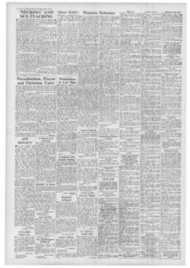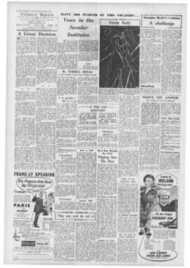Page 4, 6th March 1959
Page 4

Report an error
Noticed an error on this page?If you've noticed an error in this article please click here to report it.
Tags
Share
Related articles
On Conscription
Conscription W E Were Glad To See The Catholic Name Of
— Don't — Call Up Mothers
Questions Of Tue
Mi The Editor Answer To Moloton Readers Of Mr. Molotov'ti
A Great Decision
MUCH less importance than its due has been given to the ending of national service, that is. conscription, by this country. Christians should be extremely proud of the fact that Britain has had the courage to make this decision and thus give a lead to the whole world.
It is true that the world and this country are theoretically at peace. but in fact we all know that the ending of the second world war has brought not peace, but a continuous state of international tension during which no major international problem has been settled. If we are not at war, we live nevertheless on the brink of war, and one can be pretty certain that war would have broken out long ago, but for the fear of the un i versa I destructive effects of nuclear weapons.
Vor a major country to end conscription at such a time, whatever the technical reasons, constitutes an act of moral courage pf which there have been far too few in modern history,
CONSCRIVI ION, we should realise, has been a major factor in the evolution of modern mass warfare and all the disasters to humanity which have resulted from it.
It is true, of course, that in all ages conscription of a sort has existed. That is to say, in all times man, who should be free to choose for himself whether his beta and vocation are to take up arms told, above all, free to decide whether the cause for which he is fighting is a just one, has been forced to fight.
In the Middle Ages, the ordinary citizen was often bound by feudal oaths to serve his lord in the wars and fights which were always breaking out. In fact, we owe it in large part to the Franciscan movement that this state of affairs came to an end. One of the rules of the Third Order, that is the layfolk who sought to live in the world according to the Franciscan spirit, was that such oaths should not be taken. So great were the numbers affected and so powerful the Franciscan movement especially in the growing communes or towns that it proved in general impossible to maintain the custom of feudal oaths, For a long period after that fighting was in the hands of mercenaries, in other words men who freely chose fighting as a career and fought for those who paid them best. Then and later, impressment to make up for deficiency of recruitment became a common practice. But it obviously only affected a very small proportion of the people.
It was Napoleon who really started conscription in the modern sense of the word, and with Napoleon started the era of large-scale modern warfare in
which millions have been forced to fight against their will and to tight without the right to decide on the justice or sanity of wars. On the contrary, the effect of conscription has been not only to enslave men's bodies and minds, bot to commit whole peoples to the "cause" for which wars were fought without opportunity of reflection or intelligent choice.
Wars became national or popular, and propaganda, added to conscription, caused the involvement of whole peoples in the " patriotism " of war. Persona' judgement and even moral conscience came to be regarded as iniquitous expressions of unpatriotic behaviour and defeatism.
It is really curious that in an age which prided itself on its liberalism and democratic freedom there emerged this form of servitude so subtle and so permeating that scarcely anyone dared raise his voice against it —and this despite the overwhelming evidence of the uniform disaster it caused to the world.
ONE does not deny that some causes were relatively good and some relatively bad, but the distinction made po practical ditterence. Many good Germans in the last war were as much enslaved to Bitlerite war as the Allies, with better reason, were to the Allied cause. And the issue would never have arisen at all in that way but for the evil of conscription.
Christians, unfortonately, were as much involved in the evils of conscription and all its consequences to civilised mankind as non-Christians. This is the main reeson why the Catholic teaching on just war has in practice been so largely disregarded.
It is only in quite recent times that conscientious objection has been recognised by some countries, thus affording a few Christians the opportunity of dissociating themselves from the military aspect of modern war in the name of Christian moral principles. Even so, the very magnitude and " totalitarian character " of modern war, for which conscription was so largely responsible, has now made it virtually impossible to distinguish in practice between combatants and non-combatants.
The ending of national service in this country has certainly not been due to the realisation of the enormity of the evils which the introduction of conscription in the modern world brought in its train. But that is no reason why Christians should not be the first to appreciate the fact that the decision is accidentally one of the most far-reaching that can be, and to rejoice accordingly.
If only the sanity of the gesture could be realised and widely imitated, we might yet reach a stage of world peace in which conscription would be seen to be the great evil it is.
blog comments powered by Disqus











